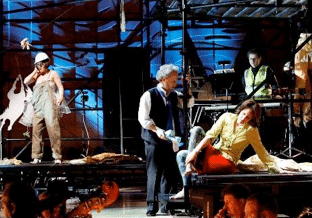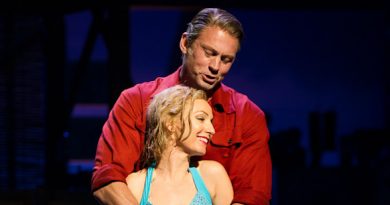Gill’s triumphant finale
In his final opera program as Musical Director for Victorian Opera, Richard Gill’s confirms his philosophy of programming rarely performed operatic works and presents two delightful one act 20th century operas that stretch the boundaries of conventional opera in surprising ways.
Spanish composer Manuel De Falla’s Master Peter’s Puppet Show premiered in 1923 and is based on an episode from Cevantes’s Don Quixote.
Master Peter puts on a puppet show of The Rescue of Melisandre but is thwarted in his attempt when his narrator (The Boy) continually elaborates on the story, and by Don Quixote, who’s fevered imagination sees the shadows of the puppets as real. Don Quixote chivalrously attacks the shadows with his sword, brings down the set and ruins the show.
In a case of dream casting, Carlos Barcenas, with his rich baritone, is perfect as Master Peter and Ian Cousins brings his wealth of operatic experience to the deranged but sympathetically portrayed Don Quixote.

In the pants role The Boy, young soprano Lotte Betts-Dean with her pitch-perfect, clear ringing voice nails the heraldic style required to deliver the declamatory music and frenetically paced Spanish text. Through no fault of her own Betts-Dena’s bravura singing is lost in the later stages due to the escalating sounds of the big brass of the orchestra, conducted by Daniel Carter in his main-stage debut. However this is a small quibble in the midst of much excellent music making.
Master Peter’s Puppet Show is director Nancy Black’s first opera but she is very experienced with puppetry as director of Black Hole Theatre. With designer Adam Gardnir, she has created a visually resplendent world for this drama. Set in what could be a rustic barn or tavern, four shadow puppeteers illustrate The Boy’s narration behind large sheets hung over scaffolding.
The show is full of magical images: some as delicate as a floating handkerchief or the tentative kiss of lovers, others more dramatic like the flogging of Melisandre’s lover or a striking scene of galloping horses with eyes aflame. Black’s Master Peter’s Puppet Show is a spectacular feast for the senses.
The 103 year old American composer Elliot Carter, though the recipient of two Pulitzer Prizes for music, is not well known in Australia. What Next, his only opera, premiered in 1999 to mixed reviews – including one that suggested the piece should be called Six Characters in Search of a Librettist. What is both challenging and fun about this piece is its post-modern exploration of language as sound amid the absence of literal narrative.
What Next begins with a chaotic percussive introduction by musicians each placed on different levels of high scaffolding, dressed in fluro road worker jackets and hard hats. The faces of a modern family comprising Mama, her ex-husband Zen, his girlfriend Stella, Zen and Mama’s son Harry or Larry, his fiancé Rose and a boy appear from behind a curtain – the remaining wreckage of Master Peter’s Puppet Show.
The characters begin communicating only in sung sounds, then single words that are traded like a word association game. As the communication becomes more coherent it is apparent that the group was on its way to a wedding and “there has been some kind of accident”.
In what reminded me of the never-ending TV drama Lost, clues to the predicament are delivered then disappear amid soap-opera like squabbling – at one stage the characters, thinking they’ve found a way out exit the stage only to reappear, clothes and hair doubly awry, having evidently suffered another mishap. We’re locked in a time warp – the characters could be dead or, in a similar purgatory, playing out a tawdry domestic drama in a suburban back yard.
The even cast confidently handle the mostly atonal music and chaotic libretto. Jessica Aszodi, moving here into a more dramatic vocal sphere, shows a flair for comedy and is strong as the constantly singing Bride-to-be opera singer Rose. She is solidly backed up Gary Rowley as Harry or Larry, Ireni Utley as Mama, and tenor Tim Reynolds (Zen).
Most pleasing was mezzo Emily Bauer-Jones as the astronomer Stella – catching the word ‘serious’ to sing on the mysteries of Sirious, her warm, even voice and honest delivery shone in the clear acoustic of the Recital Centre.
What Next is sung in English, but with such percussive music, it would be impossible for the audience to keep up with the action without surtitles. Whether this is a flaw of the opera itself, or the venue, it is difficult to say. And while I wanted Master Peter’s Puppet Show to go on forever, What Next? is 10 minutes too long – after 30 minutes there are no more surprises, and the madness of the characters becomes tedious.
They are but small criticisms of a most stimulating, enjoyable night of opera-theatre and this double bill is a triumphant finale to Richard Gills tenure as Musical Director of the Victorian Opera.


